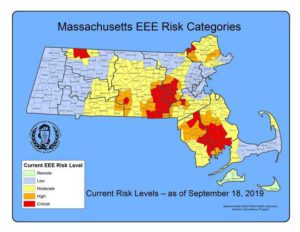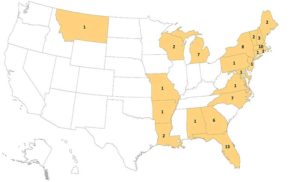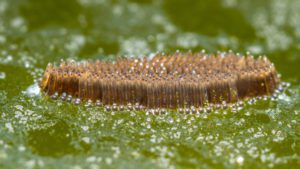MASSACHUSETTS LEADS IN EEE MOSQUITO VIRUS CASES
By Chris Williams on September 25, 2019.
It’s late September and you figure summer is over. You’re unpacking sweaters and putting away the sunscreen and insect repellent. Not so fast! As far as mosquitoes are concerned, there’s plenty of biting time left.

Risk Map from WCVB.com https://www.wcvb.com/article/9th-human-case-of-eee-confirmed-in-massachusetts/29112843#
You’ve no doubt seen items in the news about outbreaks in various states, especially Massachusetts, of Eastern Equine Encephalitis virus or EEE. Twenty-one people in several states (MA, MI, RI, CT, NJ, NC) have been diagnosed with EEE so far this season and five have died, including one in Massachusetts. As of September 18, the 9th human case of EEE in Michigan had just been confirmed and there are no doubt more by now. Should you be worried? Nine cases in the whole state doesn’t sound like a lot and we’ve heard so much about different mosquito-transmitted diseases lately, what’s just one more?
If the numbers don’t impress you, the high 30-40% mortality rate of EEE might get your attention. Remember, too, that these are just the reported and confirmed cases. There have no doubt been many more cases of people getting very sick and recovering without ever knowing that their illness was caused by a mosquito bite.
FACTS ABOUT EASTERN EQUINE ENCEPHALITIS
EEE is a potentially fatal viral disease that can affect people of any age. Flu-like symptoms appear 4-10 days after the bite of an infected mosquito and can include headache, high fever, chills, and vomiting. The disease can progress rapidly to seizures and coma. Often those that survive are left with serious mental and physical disabilities. There are no antibiotics, anti-viral drugs, or specific treatments for EEE.
Animals, especially horses, can get EEE (hence the name) but are usually not implicated in passing it on to people since the amount of virus in their bloodstream is too low to pass the disease on to biting mosquitoes. So far this season, Massachusetts has also confirmed 7 cases in horses and one goat.
EEE INCIDENCE IN OUR REGION

Eastern equine encephalitis virus neuroinvasive disease cases reported by state of residence, 2009–2018, CDC
Eastern Equine Encephalitis most commonly occurs in eastern and Gulf Coast states, and along the Great Lakes regions. From 2009-2018, the U.S. overall had an average of 7 cases of EEE each year; last year there were 6. Massachusetts has always had sporadic outbreaks of the virus with the most recent outbreak years occurring from 2004-2006 and again in 2010-2012. There were 22 human cases during those two outbreak periods. Massachusetts had a total of 10 human cases during the 2009-2018 period and is on track to top that 10-year total during this one season.
The Massachusetts Department of Agricultural Resources has been conducting aerial spraying for mosquitoes in certain counties. The Department says that there are 35 communities at critical risk, 40 at high risk, and 128 at moderate risk for the EEE virus.
DON’T BECOME A LATE SEASON STATISTIC

Mosquito eggs on surface of garden pond. Shutterstock.
The Centers for Disease Control and Prevention advises people to wear long sleeves and pants, use insect repellents, repair screens on windows and doors, and empty standing water in containers or puddles in yards. Visit CDC’s Eastern Equine Encephalitis website for more information, including answers to Frequently Asked Questions and incidence maps.
Perhaps the most important thing to remember is that this mosquito disease season is not nearly over. You need to keep your guard up until after the first frost. Mosquitoes will remain active and biting until then!